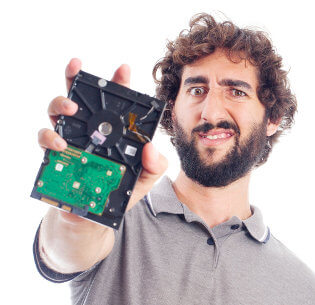
If you’re suffering the consequences of a sudden hard drive failure or an accidental format, you might consider recovering your own data. Believe us—we get it.
At Datarecovery.com, we routinely advise against those types of attempts, simply because we’ve seen so many cases in which misguided recovery attempts made the client’s situation much, much worse. If you don’t know exactly what you’re doing, you can easily damage a storage device or overwrite files, greatly reducing your chances of successful file retrieval.
With that said, we understand that some people don’t have hundreds of dollars to throw at a data recovery attempt. But before you try to recover your own data, ask yourself these questions:
Is this data critically important?
If you absolutely need the data in question, we strongly recommend trusting the case to professionals.
Consider the worst case scenario and think about what you’d do if your files were permanently unrecoverable. If you couldn’t recreate the data—for instance, if you’re trying to recover treasured photos of a family member or the first draft of your novel—call a professional data recovery company. While the data recovery process is typically expensive, some failure scenarios are relatively simple, and reputable providers offer multiple service options to help you keep costs low.
However, if you can recreate the data somehow—for instance, if you’re recovering a spreadsheet that might take you five or six hours to put together—you can proceed. Just realize that you’re attempting data recovery as a learning experience; there’s no guarantee that you’ll get anything back.
Is this a hardware or a software issue?
If you’re trying to recover files from a damaged hard drive, you’re probably not going to have much luck. Hard drive data recovery (and, by extension, RAID data recovery) require extremely specialized tools and a dedicated clean room environment.
Software issues might leave you in a better position to attempt recovery. If you accidentally deleted files or lost access due to file corruption, malicious software attacks, or for other logical reasons, software could help you get the files back in some instances.
Do I have enough experience with computer storage to attempt a recovery safely?
We once received a shipping container full of loose hard drive platters—they’d been taken out of the drive, and the client hadn’t included the logic board or other components.
When we asked what had happened, the client explained that they’d damaged those parts while taking the drive apart. They’d assumed that they could fix their own hard drive since they had experience with vehicle engines and heavy machinery; how could a hard drive be that much more complicated?
We wouldn’t say that digital storage media is more complicated, per se, but data recovery certainly requires different knowledge and expertise. If you don’t understand how computers store data, you’re more likely to make a mistake, and your at-home recovery attempt is going to cause a great deal of frustration without delivering results.
If you decide to recover your own data, use high-quality, well-reviewed data recovery software. Make sure that you don’t install the software on the same device with the data in question (otherwise, you might end up overwriting your files). Proceed with caution, and don’t expect miracles if your computer is showing signs of hardware failure.
And if you really, really need the data, contact the professionals. There’s no reason to take unnecessary risks with crucial files, and our engineers will be happy to advise you on safe steps you can take to reduce your costs and get your files back in working order. To speak with one of our specialists, call 1-800-237-4200.




